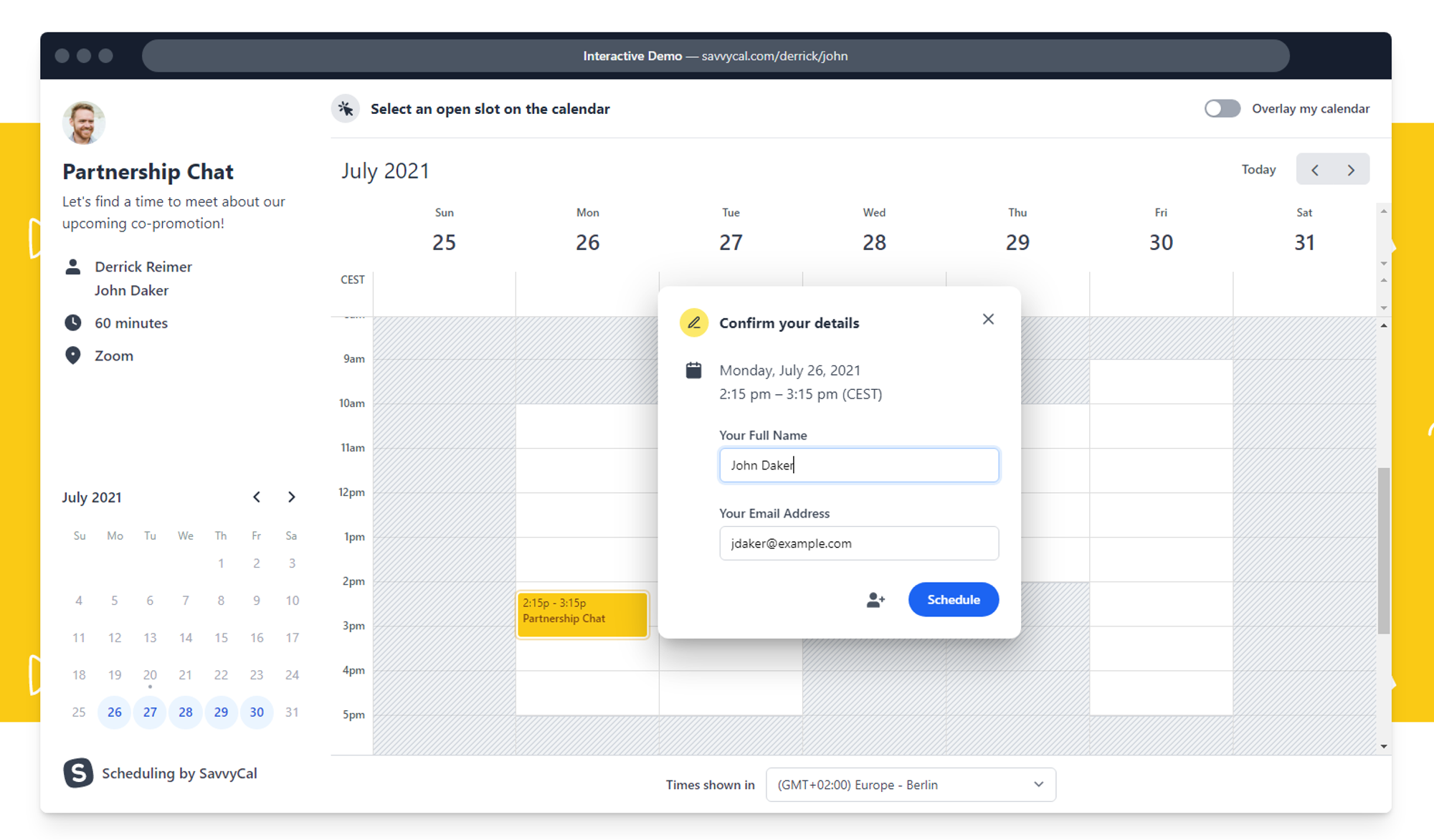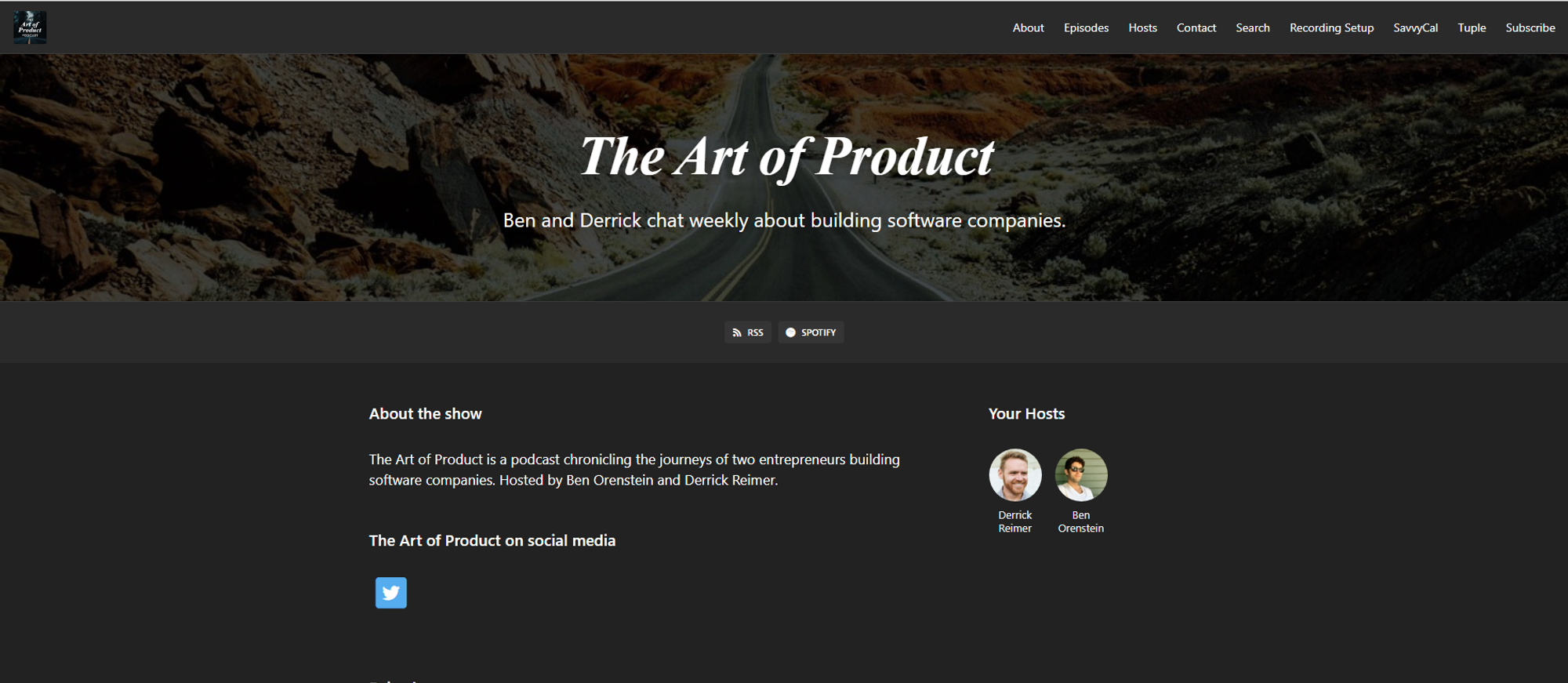SaaS Dialogue 5: SavvyCal - making scheduling comfortable & fast
Hey Derrick! Can you tell us a little about your story?
Sure! I'm a self-taught developer turned founder. My best days are those when I get to dig into a tricky product problem and craft an elegant solution. I spend most of my first decade in the industry helping start and grow Drip (acquired in 2016 by Leadpages) and learning the SaaS ropes from my mentors. Now, I'm back in the founder seat with SavvyCal.
So what's SavvyCal & why did you decide to build something there are quite a few similar tools for?
SavvyCal is a scheduling tool for busy people who need to find time to meet with colleagues, customers, partners, etc. Over time, I started to identify a few problems with existing tools that could use innovation: the awkward power dynamics of sending a scheduling link and hesitancy around wrecking your schedule if someone books a suboptimal time. No one was really solving these problems in a compelling way, so I entered the space!

Who is your audience & how did you figure out the product-market fit?
We are primarily positioned for startup founders and executives, but we are beginning to expand into more areas of the organization (like customer success and sales teams). Ultimately, SavvyCal is a pretty "horizontal" tool, which presents a great opportunity to explore different niches and see how we can make SavvyCal a key part of their workflow. For example, we have a number of podcasters using SavvyCal to schedule recording times with guests, and I'm really excited about growing more in this niche.
My strategy was to start by marketing to people already in my Twitter and podcasting sphere to learn what problems these folks need solving — and then find more people like them! We are gradually expanding our reach as the product matures and more people find out about it.
What are your most successful marketing strategies?
If I told you, I'd have to kill you…just kidding :). The truth is we haven't really identified a single knock-out channel (but each of our experiments has contributed to a nice growth trajectory). We've played with podcast ads, some search engine ads, podcasting, staying active on Twitter, and some big splash events like our Product Hunt launch. We are in the process of rolling out customer referral and affiliate programs since SavvyCal already has a very strong word-of-mouth spread.
Can you tell us how your affiliate program works?
We decided to keep it simple — a flat 25% commission on revenue, with some standard terms around what kind of promotion is allowed. I've had to learn that an affiliate program takes time to ramp up. Other founders I've spoken with who have successful affiliate programs have a few top affiliates who drive a majority of the sales from that channel, so we are definitely focused on developing strong relationships with affiliates who love the product and want to make our affiliate program a key part of their business.
Wanna take us on a journey along the whole SavvyCal process? Starting at the idea to the current state.
I broke ground on the codebase in April 2020 and onboarded my first customer in July. We launched to the public in September and on Product Hunt in January. We crossed the $1,000 MRR mark in November 2020 and right around that time I started working with Corey Haines (our part-time head of growth). Bringing a smart marketing into the fold at this early stage allowed me to keep focusing on the product without stalling out our marketing momentum.
The SavvyCal landing page has three sections just showing social proof. Is the importance of social proof underestimated?
I do think that a lot of product sites could stand to use more social proof. I've found it to be one of the most powerful things that nudges me over the edge on trying a product. I think it's pretty baked in our human psychology.

What's your drop-off rate on signups?
Our funnel looks like this: sign up for a free account, start a trial when you are ready to activate links, and convert to a paid plan after 7 days. We have an onboarding sequence that starts after the first step to help educate people about the product and inspire them to keep going. If they don't make it to the next step, we try our best to offer support. It's admittedly pretty difficult to get tangible feedback from most users who don't activate, still working on optimizing that part!
What's your advice for upcoming Indiehackers?
Before building your idea, spend some time having conversations with your target market. Read The Mom Test by Rob Fitzpatrick for the definitive guide on how to eliminate a bunch of biases that can easily creep into these conversations.
What are the pros/cons of being self-employed & how did you know that you'll pursue it?
The biggest pros that keep me motivated are the freedom to work on things that I love and the uncapped earning potential of owning your own business. But it's not all roses — the buck stops with you as the owner and there are many jobs you'll have to do (for a while, at least) that you really don't love. You have to have a bit of an appetite for risk (though I consider myself to be fairly risk-averse).
Next to your SavvyCal workload you also host a Podcast "The Art of Product" - How do you find interesting topics to talk about & on what channels do you promote it?
The only way doing the weekly podcast is sustainable for me is by harvesting stories almost entirely from what I've worked on in the last week :). It took some time to learn, but I've found the best "radio" comes from trying to craft stories around insights that I've learned (rather than just brain dumping information). We don't really promote the podcast outside our Twitter spheres, but have found the most growth in listenership happens when we interview the occasional guest who shares the episode with their audience.

Last but not least, which other founders should we talk to?
My mastermind buddies are both working on interesting new products: Peter Suhm of Reform.app and Matt Wensing of usesummit.com.
Thank you for the interesting insights, Derrick!
Check out SavvyCal: https://savvycal.com/
Or follow Derrick: https://twitter.com/derrickreimer